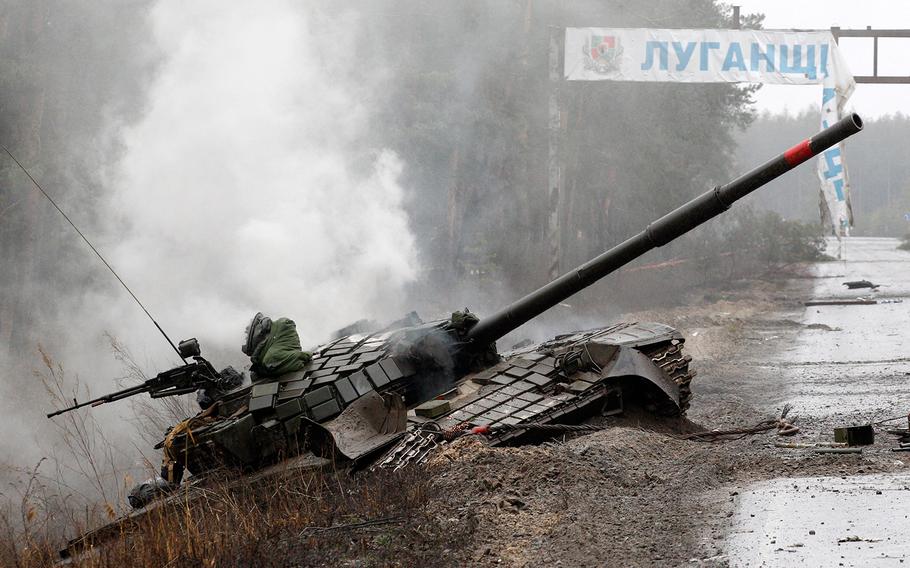
Smoke rises from a Russian tank destroyed by the Ukrainian forces on the side of a road in Lugansk region on Feb. 26, 2022. (Anatolii Stepanov/AFP)
Russian soldiers short on morale and weapons have refused orders, sabotaged their own equipment and shot down one of their own aircraft, Britain's spy chief said Thursday, painting a picture of chaos on Russia's front lines as the war in Ukraine drags into its second month.
The efforts are evidence of Russian President Vladimir Putin's miscalculation when he decided to invade Ukraine, Jeremy Fleming, head of Britain's signals intelligence agency, said in a speech Thursday at Australian National University. U.S. and British officials have said Putin, more isolated than ever, was misinformed by his aides, further stoking tensions.
"It's clear he misjudged the resistance of the Ukrainian people," Fleming said. "He underestimated the strength of the coalition his actions would galvanize. He underplayed the economic consequences of the sanctions regime. He overestimated the abilities of his military to secure a rapid victory."
Putin's "strategic miscalculation" has cost innocent Ukrainian lives — and now is being felt by "ordinary Russians, too," Fleming said.
Putin has attempted to stop news of the setbacks from reaching Russians, but Fleming said his efforts have failed to quell the growing global support for Ukraine, whose president, Volodymyr Zelensky, has operated an "extremely effective" information campaign.
In the months leading up to Russia's Feb. 24 invasion, U.S. and European officials repeatedly cited intelligence reports to warn of Putin's plans to launch an assault against Kyiv.
The West's success in anticipating Russia's strategy so far has buoyed the credibility of its intelligence, said Australian National University's John Blaxland, who specializes in international security and intelligence. He added that he finds the "startling" details in Fleming's speech "reliable."
"I am actually reasonably confident that we can place trust in what he said, because in due course, we will be able to corroborate it," Blaxland said.
But other observers have cautioned against dismissing the strength of the Russian military, warning that the Kremlin has shown little sign of backing down from its war efforts. "We are now running into the risky business of simply underestimating the quality and capacity of the Russian force," said Alexey Muraviev, a national security expert at Australia's Curtin University.
Although Muraviev said he does not question the veracity of the British spy chief's claims, he argued that it is critical to distinguish between Russia's own service members and the Russian-backed separatist troops in Ukraine's eastern Donbas region. The latter, who are Ukrainians recruited to fight on Russia's side, are more likely to suffer from the kind of breakdown outlined in Fleming's speech, Muraviev added.
Despite the heavy losses Russia has incurred in the past five weeks, Western officials and observers say Putin shows little sign of abandoning his war efforts, possibly influenced by advisers misleading him about how badly the Russian military is performing and how his country's economy is being crippled by sanctions, according to the White House. For instance, Russian soldiers have surprisingly relied on unsecured communication devices on the battlefield, which has proved to be a costly mistake.
But chief among Putin's miscalculations, Muraviev said, was his failure to gather accurate intelligence that portrays the "psychology" of the Ukrainian public, which has greatly turned against Moscow since the 2014 annexation of Crimea.
"It almost seems like Putin indoctrinated himself ... and his inner circle," Muraviev added.